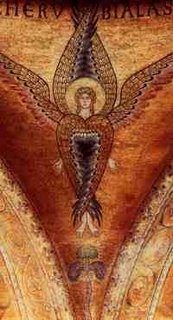In my En.11 classes we are studying Macbeth wherein this concept of equivocating is very important to understanding how Shakespeare uses the speech of the witches to characterize them as being evil. Hence, anyone who speak such-and-such a way, is that way as a person. Accordingly when we first meet Macbeth, he equivocates, saying, "So foul and fair a day I have not seen." As the story continues the equivocation takes on more serious consequences than merely suggesting there is no distinction between good and foul weather.
Woe unto them that call evil good, and good evil; that put darkness for light, and light for darkness; that put bitter for sweet, and sweet for bitter!

This reversal of values and equivocation continues in our time: . 'Woe unto them that call evil good,' but that is exactly what we have done. We have lost our spiritual focus and reversed our sense of what is virtuous:
We have exploited the poor and called it the lottery. We have rewarded laziness and called it welfare.
We have killed our unborn and called it choice. We have shot abortionists and called it justifiable. We have neglected to discipline our children and called it building self esteem. We have abused power and called it politics. We have coveted our neighbor's possessions and called it ambition. We have polluted the air with profanity and pornography and called it freedom of expression. We have ridiculed the time-honoured virtues of our forefathers and called it enlightenment.
Reading Isaiah is a good way to put a stop to the spiritual wickedness which is equivocation.
Washing clean the concepts we think with and the words we use to express our concepts with is necessary.
This is when it is wise to recall Christ's saying about "Yea and Nay".

1 comment:
what an inspiring barbaric yawp.
thank you thomas, definetely something I needed to read.
Post a Comment